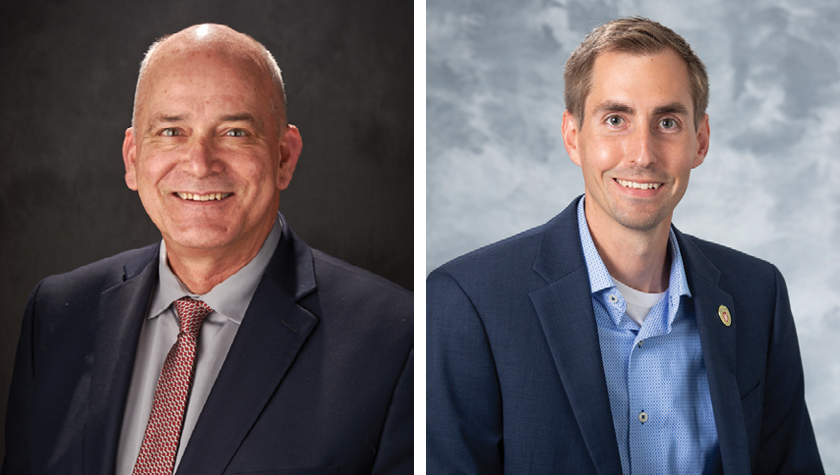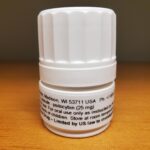
A new study led by School of Pharmacy researchers seeks to separate the psychedelic experience from psilocybin’s therapeutic effects
By Arushi Gupta
Psychedelic drugs have profound effects on the brain, substantially altering perception, mood, and even the hardwiring of our brains.
Because of their potential to cause a long-term changes to how our brains process information and emotions, drugs like MDMA, LSD, and psilocybin are being studied as a possible breakthrough for mental health treatments. While studies on the clinical use of psychedelics are showing great promise, one big question remains: Is the psychedelic experience necessary to gain the mental health benefits?
Groundbreaking research at the University of Wisconsin–Madison School of Pharmacy by Assistant Professor Cody Wenthur and Professor Paul Hutson seeks to answer that question.
Wenthur and Hutson, both of the School’s Pharmacy Practice Division, are collaborating on a cutting-edge pilot study focused on psilocybin — a naturally occurring hallucinogen that has shown significant promise in treating several psychiatric disorders, including major depression and end-of-life anxiety.
“This study gets to one of the fundamental questions in the field, which is whether the conscious experience of psilocybin drives therapeutic benefits.”
—Cody Wenthur
“This study gets to one of the fundamental questions in the field, which is whether the conscious experience of psilocybin drives therapeutic benefits, or if the neuroplastic changes it causes are sufficient to do so,” says Wenthur.
Currently, treatments using psilocybin or other hallucinogenic drugs are coupled with time- and resource intensive psychotherapy sessions. If it’s possible to have effective therapeutics without that extra requirement, it could increase treatment access.
“It’s a very hard question to answer, and we have designed a unique study to get at this core challenge in the field of psychedelics,” he says.
Designing the experience
Hutson and UW–Madison are no strangers to studies involving psychedelics. In fact, Hutson led the first phase 1 psilocybin clinical trial in 2015.
Under the Controlled Substances Act, most psychedelics are currently Schedule I substances, which means that a psychedelic drug product needs to be assessed for abuse potential as part of its safety evaluation. The School of Pharmacy is uniquely equipped for this cutting-edge study in that Hutson is one of few researchers around the country who holds the necessary investigational new drug exemption and Schedule 1 license for the project.

In order to ensure safety of the participants, Hutson says the facilitators underwent extensive training to manage participants under the influence of psilocybin, who are expected to have strong visual and emotional experiences. The participants themselves, who will be screened for psychological conditions that aren’t compatible with psilocybin administration, will also be prepared before their dose and will have a debriefing session afterward. Throughout the experience, participants will have their heart rate, blood pressure, and anxiety level monitored.
What sets this study, funded by UW–Madison donors Michael and Mary Sue Shannon, apart is what happens when the psilocybin is administered. At the same time they receive the psilocybin dose, participants will also receive the first of several doses of midazolam, an injectable drug that is normally used during surgeries or procedures that require patients to remain awake but calm. Midazolam leaves patients feeling drowsy and with no memory of what happened during the surgery.
By administering psilocybin and midazolam together, Hutson and Wenthur are allowing study participants to fully experience psilocybin’s psychedelic effects, but with no lasting memory of the experience.
Minding memory
While Hutson — who has a breadth of experience studying psilocybin and MDMA — handled the design of the participants’ medicated experience, Wenthur set up the protocols for testing the effectiveness of the combination on elimination of memory traces.

To understand whether memories for particular facets of the experience are more relevant than others, Wenthur will be quantitatively assessing amnesia for various domains of stimuli and the persistence and fidelity of these reports across time. The study team will be assessing multiple domains because they hypothesize that not all memories are likely to be equivalently relevant to the potential therapeutic effects of psychedelic-assisted psychotherapy. These memory tests will incorporate well-established analytical approaches across both known tasks and some more novel, exploratory approaches.
Through this study, as well as additional efforts in animal models, Wenthur hopes to shed light on how different signaling pathways intersect with one another to influence neuroplastic outcomes. Hence, the combination of the psilocybin and midazolam could be affecting memory as well as the signaling that’s actually occurring in the brain.
A powerful, collaborative approach
Hutson and Wenthur both have a breadth of expertise in research regarding new therapeutics for psychiatric disorders, including treating opioid use disorder with psilocybin, PTSD with MDMA, and major depression with ketamine.
The pair are also some of the main forces behind the creation of a new, first-of-its-kind, master’s degree option in Psychoactive Pharmaceutical Investigation at the School of Pharmacy, with the first class now enrolling for fall 2021.
In addition to Wenthur and Hutson, the research team is composed of a diverse group of investigators from across the UW–Madison campus, including Christopher Nicholas and Randall Brown of the Department of Family Medicine and Community Health, Chuck Raison of the School of Human Ecology, John Dunne of the Center for Healthy Minds, and Richard Lennertz and Matthew Banks of the Department of Anesthesiology.
“This study and its research team exemplifies the transdisciplinary nature of research with psychedelic drugs such as psilocybin,” says Hutson.
For this pilot study, slated to begin in May 2021, the research team is first hoping to confirm that the combination is safe and effective in producing a psychedelic experience that patients don’t remember, laying the groundwork for a future study of its impact on adults with major depressive disorder.
“This study and its research team exemplifies the transdisciplinary nature of research with psychedelic drugs such as psilocybin.”
—Paul Hutson
“In our planned follow-up study, the question to be addressed is whether psilocybin’s anti-depression effect occurs even if the patient cannot remember the psychedelic experience,” says Hutson.
Regardless of that study’s outcome, the results will inform future depression treatments. If patients see no improvement, then the psilocybin dose may need to be titrated to produce some level of psychedelic experience. If the study instead shows the experience isn’t necessary, then researchers can begin looking for non-hallucinogenic drugs that bind to the serotonin receptor similarly to psilocybin.
“It is our hope that this study will open the door to a future with more effective treatment approaches for millions of patients worldwide who are living with depression,” says Wenthur.